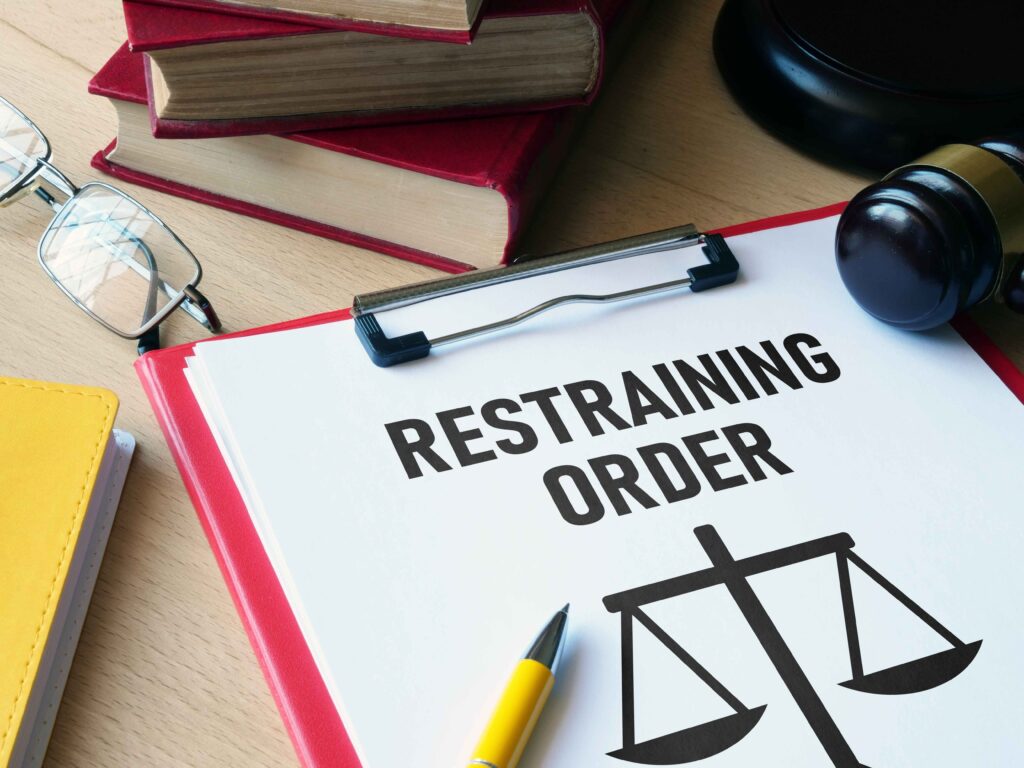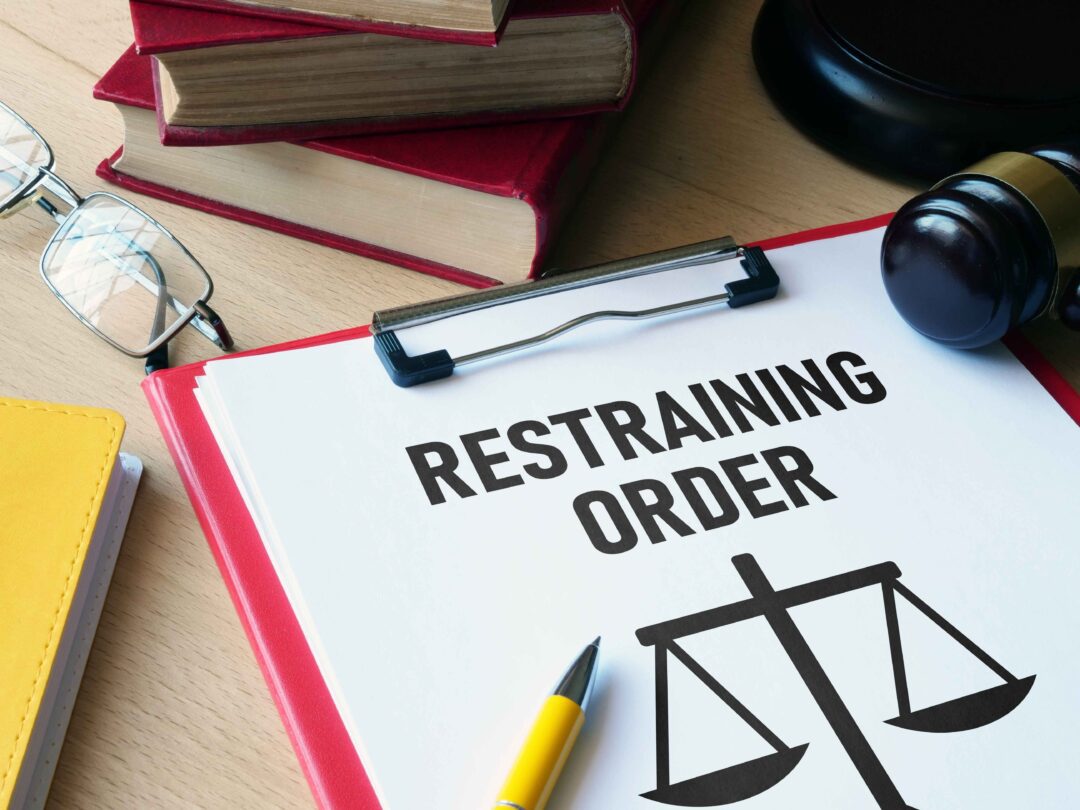
In California, restraining orders can significantly affect child custody decisions. If a parent is subject to a restraining order, particularly one involving domestic violence, the court often presumes that granting custody to the restrained parent is not in the best interest of the child. This legal presumption can result in restricted visitation, supervised custody, or even the complete loss of custodial rights.
Understanding the legal nuances around restraining orders and child custody is critical for any parent involved in a family law dispute. Moore Family Law Group offers unparalleled experience in navigating these sensitive and high-stakes matters, ensuring that your child’s safety and your parental rights are both prioritized.
What is a Restraining Order?
A restraining order is a legal mandate issued by a court to protect an individual from harassment, abuse, stalking, or threats. It can prohibit the restrained person from contacting or coming near the protected individual, their home, or their children.
Types of Restraining Orders
- Domestic Violence Restraining Orders (DVRO): Typically filed in cases involving abuse between intimate partners or family members.
- Emergency Protective Orders (EPO): Issued by law enforcement and last only a few days, often used in emergency domestic situations.
- Temporary Restraining Orders (TRO): Short-term orders issued until a full court hearing can take place.
- Civil Harassment Restraining Orders: Filed when there’s harassment by someone not closely related, such as a neighbor or coworker.
Child Custody Laws in California
An overview of child custody laws provides the framework courts use to evaluate custody when a restraining order is in place.
Legal vs. Physical Custody
- Legal Custody: Refers to the right to make decisions about the child’s education, healthcare, and general welfare.
- Physical Custody: Refers to the arrangement of where the child resides and the division of time between parents.
Best Interest of the Child Standard
California courts prioritize the child’s health, safety, and welfare. The guiding principle is what serves the best interests of the child, which includes maintaining frequent and continuing contact with both parents unless it would be detrimental.
Factors Courts Consider
- History of abuse or violence
- Substance abuse by either parent
- Stability of the home environment
- Parental involvement and relationship with the child
How Restraining Orders Affect Custody Determinations
Restraining orders have direct implications on both legal and physical custody in California family courts.
- Presumption Against Custody to the Abuser: California Family Code Section 3044 establishes a legal presumption against granting custody to a parent with a history of domestic violence within the past five years. [1]
- Impact on Legal and Physical Custody: Courts often limit both legal and physical custody, especially in cases involving credible threats or physical harm.
- Visitation Restrictions and Supervised Visits: If custody is not revoked, supervised visitation may be ordered to protect the child.
Domestic Violence and the Family Code
Understanding Section 3044 of the Family Code is essential when dealing with custody in the context of domestic violence.
California Family Code Section 3044 Explained
Section 3044 of the California Family Code creates a rebuttable presumption that awarding custody to an abusive parent is not in the child’s best interest. This applies if a parent has perpetrated domestic violence within the past five years.
Burden of Rebuttal by the Restrained Party
To overcome this presumption, the restrained parent must provide compelling evidence, such as completion of a 52-week batterer intervention program, evidence of ongoing therapy, and proof of a stable, non-violent environment.
Temporary vs. Permanent Custody Changes
Custody arrangements can shift depending on whether the restraining order is temporary or long-term.
- Impact of Temporary Restraining Orders (TROs): While temporary, these orders can influence initial custody decisions and serve as the basis for long-term arrangements.
- Long-Term Custody Implications of DVROs: Permanent orders (typically lasting up to five years) can solidify restricted custody or visitation schedules, setting a precedent for future custody modifications.
Supervised Visitation as a Solution
Supervised visitation is often employed when a parent poses a potential risk but is not entirely excluded from the child’s life.
When It’s Ordered
Courts may order supervised visitation when there is a concern for the child’s safety or emotional well-being.
How It Works in California
Supervised visitation usually takes place at court-approved visitation centers or in the presence of a neutral third party.
Role of Parenting Plans
A structured parenting plan can help implement and manage supervised visitation, including pickup times, locations, and guidelines.
Evidence Considered by the Court
California courts rely on a wide range of documentation and testimony to assess whether custody should be limited or denied.
- Police Reports: Crucial for establishing a history of violence or threats.
- Medical Records: Provide documentation of physical injuries.
- Witness Testimonies: Can corroborate or dispute claims made by either party.
- Previous Court Orders: Help the judge understand ongoing legal history and patterns of behavior.
False Allegations of Abuse
The court treats allegations of abuse with gravity, while also safeguarding against the misuse of the system.
How They Are Handled
Courts examine all available evidence thoroughly before making custody decisions based on abuse allegations.
Legal Repercussions
Making false claims can lead to loss of custody, fines, or criminal charges against the accuser.
Importance of Legal Representation
Experienced family law attorneys like those at Moore Family Law Group are essential in defending against or proving false allegations.
Impact on Parental Rights
The consequences of a restraining order can reach as far as permanently altering or revoking a parent’s rights.
- Possibility of Termination: In extreme cases, repeated abuse may lead to the complete termination of parental rights.
- Modification or Revocation of Custody Rights: Courts can permanently alter custody arrangements to protect the child.
Rehabilitative Efforts and Custody Reinstatement
Efforts toward rehabilitation can influence a judge’s decision on restoring parental rights or modifying custody.
- Anger Management and Parenting Classes: Completion can support a parent’s case to regain custody.
- Counseling and Reunification Therapy: Professional intervention helps repair damaged parent-child relationships.
- Rebutting the 3044 Presumption: Requires a comprehensive showing of change and commitment to the child’s well-being.
Role of the Judge and Family Law Attorneys
Judges and attorneys are central figures in determining and influencing custody outcomes.
- Discretion of the Judge: Judges consider all facts and evidence, and have wide discretion in custody decisions.
- Importance of a Competent Attorney: Effective legal representation can influence the court’s perception and outcome.
- Moore Family Law Group’s Experience in Handling Such Cases: Their seasoned attorneys understand the intricate legal landscape and prioritize client outcomes.
Mediation and Restraining Orders
Despite the tension, mediation remains an option in restraining order cases, provided necessary precautions are taken.
- Can Mediation Occur? Yes, but special provisions must be made to ensure the protected person’s safety.
- Precautions During Mediation: Shuttle mediation and virtual sessions are often used in high-conflict or DV cases.
Modifying Custody Post-Restraining Order
Parents may be able to modify custody arrangements after demonstrating significant progress or improvement.
Requirements for Custody Modification
Changes must be justified by a significant change in circumstances, such as completing rehabilitation or improved co-parenting ability.
Change in Circumstances Doctrine
California courts will only modify custody if it serves the child’s best interest and shows marked improvement by the requesting parent.
Protecting the Child’s Best Interests
Ultimately, California courts focus on ensuring the child remains safe and nurtured, regardless of the complexity of the situation.
- Safety and Stability Considerations: Courts emphasize minimizing disruption and maintaining a safe environment.
- Child’s Preferences (Age-Dependent): In California, children 14 and older may express a custodial preference, which the court may consider.
What to Do If You’re Facing a Restraining Order
Taking prompt and appropriate action can help protect your rights and possibly influence the court’s decisions.
- Immediate Steps: Comply with the order and avoid contact with the protected party.
- Contacting Legal Help: Secure legal representation immediately to defend your custody rights.
- How Moore Family Law Group Can Assist: Their attorneys provide strategic guidance, evidence preparation, and courtroom advocacy.
Frequently Asked Questions
Can a restraining order automatically remove custody rights in California?
No, but it creates a strong legal presumption against awarding custody to the restrained parent.
How long does a DVRO affect child custody?
Typically up to 5 years, but it can be renewed and significantly shape long-term custody outcomes.
Can grandparents get custody if both parents have restraining orders?
Yes, courts may grant custody to fit guardians like grandparents in the child’s best interest.
What if the child wants to stay with the restrained parent?
If the child is 14 or older, their wishes may be considered, but the court will weigh it against safety concerns.
Is virtual visitation possible if physical visits are restricted?
Yes, courts can allow virtual visitation through video calls or other monitored means.
Secure Your Custody Rights the Right Way
If you’re facing the life-altering implications of a restraining order in a child custody matter, acting quickly and strategically is essential. The right legal team can mean the difference between limited visitation and full parental rights.
At Moore Family Law Group, we understand the gravity of these cases. Our experienced attorneys are dedicated to ensuring that your parental rights are protected while prioritizing the best interests of your child.
Contact us today to schedule your case evaluation and take the first step toward safeguarding your family’s future.





